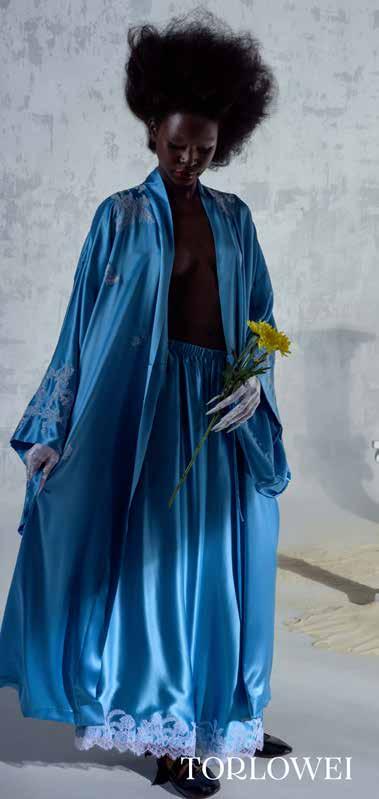SURVIV RS
By Dr. Kemi DaSilva-Ibru
Welcome to the WARIF Survivor Stories Series, a monthly feature, where stories of survivors of rape and sexual violence are shared to motivate and encourage survivors to speak their truth without the fear of judgment or stigmatization and to educate the public on the sheer magnitude of this problem in our society. The Women at Risk International Foundation (WARIF) is a non-profit organization set up in response to the extremely high incidence of rape, sexual violence, and human trafficking of young girls and women in our society. WARIF is tackling this issue through a holistic approach that covers health, education, and community service initiatives.
WARIF aids survivors of rape and sexual violence through the WARIF Centre - a haven where trained professionals are present full time, 6 days a week including public holidays to offer immediate medical care, forensic medical examinations, psycho-social counseling, and welfare services which include shelter, legal aid, and vocational skills training. These services are provided FREE of charge to any survivor who walks into the Centre.

THE TRUSTED NEIGHBOUR
My name is Temitope, I’m 23 years old, and here’s how it started….. The abuse started when I was just 14, during my time in Senior Secondary School. My mother had recently taken on a new job as a logistics manager, which required her to relocate to the Island part of Lagos. Meanwhile, my father and I remained in the house we’d lived in since I was a toddler, located on the mainland. In our compound, there was an elderly widower named Mr. Ossai, who had been living in the boys’ quarters for over five years. His grown-up children would occasionally visit him. Being an only child, my parents and had to make decisions together, and despite communicating often during the week, we eagerly awaited my mother’s return home every weekend. When turned fourteen, my dad began working weekdays, leaving me home alone when fell ill. Before he left, he made sure I had my medication, promised to check in often, and instructed me to contact Mr. Ossai next door in case of an emergency. With his goodbye, ventured to the bathroom for a bath, forgetting to lock the door but summoning courage, nonetheless. Shortly after, I heard the door open, assuming it was my dad returning for something he forgot. Calling out for him yielded no response, so I proceeded with my bath. Exiting the bathroom, I found our neighbor, Mr. Ossai, seated on the living room sofa. Informing him of my father’s absence, he gestured for me to take a seat, indicating he had something important to discuss. I asked him to come back and tell me when my dad was around. He ignored my words, stood up, dragged me to the long sofa, pulled my towel off my body, pinned me down, covered my mouth, used his penis to penetrate my vagina and raped me.
After concluding his speech, he menacingly threatened me with death, brandishing a charm-like object. He warned that if I dared to disclose what happened, I would vomit blood, leaving me with no option but to keep silent. was in terrible pain, had bruises in my vagina, and was also bleeding in my vagina region. It was my first sexual experience, a painful experience that I didn’t wish for anyone.
Upon my father’s return, he sensed something was amiss with me. Despite his attempts to communicate, repeatedly assured him that all was well, attributing my condition to a migraine. He suggested revisiting the hospital for a prescription adjustment, but I dissuaded him, citing it as premature. My reluctance stemmed from the looming threat I faced, paralyzing me into silence. Concerned, my father confided in
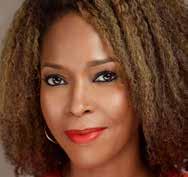
my mother, who became deeply worried and contemplated returning home. However, I deceived her, downplaying my father’s concerns, and she relented. Reflecting on this later, I regretted not understanding the peril of remaining silent in the face of abuse or assault.
From that day, my neighbour began molesting me more frequently whenever my father went to work, and I was home alone. My father was always telling him our routine, so he knew exactly when to come in to sexually molest me. I lost count of how many times Mr Ossai had raped me after a while and this continued until was eighteen (18) years old. My parents suspected something was wrong because was always isolating myself from others, I was also having mood swings, flashbacks and living in fear. The worst of them was that it affected my grades, and I began performing poorly in school. How was able to conceal so much pain emotionally and psychologically still baffles me till date. When turned eighteen, was in still in Senior Secondary School three, a new teacher moved to our school, she was friendly, jovial, and very observant. She took it upon herself to be my friend and she kept asking questions so could open up, but I did not, then she told me that I could set up whatever my pain was then I took her advice.
I saw Mr. Ossai and told him that my father was travelling after he visited his friend that afternoon, his routine visits, then my neighbour said my father must have forgotten to inform him. He grinned foolishly, and sensed he would show up that afternoon. After observing my father’s departure, he eventually arrived as expected, and I pretended as if nothing was amiss. Aware that my dad’s friend was away, a fact his daughter, my schoolmate, had disclosed earlier, I anticipated my father’s sudden return. Knowing my father’s usual routine of spending the afternoon with him, I noted that he left without notifying his friend, indicating his imminent return. To mask the sound of my father’s car, turned up the volume of the TV set. As my father recounted later, he received a call from his friend while en route, informing him of an urgent out-of-town trip. Upon his return home, he entered the living room and caught Mr. Ossai red-handed having sexual intercourse with me. My father was frozen, then he recovered and ran to the kitchen to get a knife, Mr. Ossai was lucky to have escaped a stab from my dad who was so furious. Mr. Ossai ran out naked as fast as he could for my dad chased after him while screaming for help from passersby to catch the perpetrator. Mr. Ossai who was still naked was caught by the neighbourhood security and handed over to the police for sexually abusing me a minor. The police referred us to the WARIF Centre.
At the CENTRE, I received medical assessment, treatment, and psycho-social counselling for free. The staff at WARIF Centre are very professional and dedicated in the discharge of their duties. I also access psychosocial counselling for free and this helped to begin my healing journey from trauma. My counselling sessions with the counsellor at WARIF Centre has been so impactful and very helpful. I was taught coping mechanisms to help deal with my emotions and I can confidently say am in a safe space of hope, healing, and peace. also joined the Group therapy session where developed a sense of belonging and it helped to build up my self-esteem. perpetrator was charged to court and convicted for crimes committed against me. It’s been few years now do not feel like ending my life again because I see the light at the end of my ordeal. was also exposed to the fact that there are many potentials am yet to achieve in life. I also look forward to becoming an advocate for the sexually violated in the society. There’s been total transformation in every area of my life.
Thank you to the Management and staff of WARIF Centre for restoring hope and confidence in me.
*Real name of the survivor changed for confidentiality
Dear survivor, please know that you are not alone and it is not your fault. Help is available.
If you have been raped or you know someone who has, please visit us at:
The WARIF Centre 6, Turton Street, off Thorburn Avenue, Sabo, Yaba or call our 24hour confidential helpline on 0800-9210-0009
For questions or more information please contact: info@ warifng.org
NENE KESTER, CHIDINMA OTU && GENE CHAKA
& IYABO ONIKO UZOAMAKA IGWEIKE SORAYA ADJI
ULOMA CHUKWUEKE,
UGA AKINBODE
LATASHA LAGOS
JUMMAI ILUOBE & KELLEY EDE KEKE BONGOS & LINDA WOBO EZINNE EGERUOH & TINU OKOYE MAIMUNA UMMI
DAISY EMENIKE & DERA
CHIKA CHUKWU KARL HALA JAVIER SANCHEZ
COMFORT BOOTH APRIL ABANULOR
Sunday, March 17, 2024 Vol. 22, No. 10531 Sunday March 17, 2024 Vol. 22, No. 10531 8 9
THE WOMEN LEADING AFREXIMBANK TO RESHAPE AFRICA
As part of our coverage of the International Women’s Day (IWD), Funke Babs Kufeji recently caught up with formidable female leaders of the African Export-Import Bank (AFREXIMBANK), delving into their pioneering initiatives and perspectives on women’s evolving role in finance and global trade.
AFREXIMBANK, a multilateral development finance institution, has been at the forefront of promoting economic development across the continent. The bank has made remarkable strides in facilitating cross-border trade and investment.
In this exclusive interview, the AFREXIMBANK amazons discuss the various initiatives and programmes that the bank has implemented to support women entrepreneurs and professionals. The conversation goes beyond mere policy, uncovering the real-life impacts these initiatives have had on women across Africa. Excerpts:
KANAYO AWANI
Executive Vice President, Intra-African Trade Bank
As Executive Vice-President, what are your primary goals for the Intra-African Trade Bank, especially in the context of Africa’s evolving trade landscape?
Promoting Intra-African trade and facilitating the implementation of the African Continental Free Trade Area (AfCFTA) offers us the opportunity to reverse engineer the colonial strategy that fragmented our economies and consigned Africa to the periphery of the global economy, relying on the export of primary commodities and serving as a dumping ground for manufactured and value-added exports. At AFREXIMBANK, we are committed to rectifying this and ensuring that Africa takes its development ambitions into its own hands. We recognize that there is no reason why a continent that accounts for 18% of the world’s population should only account for 3% of global trade. There is no reason why a continent which accounts for over US$1 trillion in trade, trades so little with itself. No reason why the payment for goods and services among neighbors is being routed through banks outside our continent.
It is for this reason that we have been aggressively supporting intra-African trade and have been unrelenting in our support for the AfCFTA. Through the Intra-African Trade Bank, which I lead, we have disbursed around US$40 billion in support of intra-African trade and investments since 2012. Our goal is to ensure that by 2026, which marks the end of our current strategic plan, that the level of Intra-African trade moves beyond the stubbornly low level of 16% to about 25%. We have onboarded almost 500 of the 600 regulated African banks onto our intra-African Letter of Credit Scheme, well on our way to granting an aggregate of US$8 billion to the banks in support of intra-African trade financing. We have also made tremendous investments in the commercialization of a Pan-African Payment and Settlement System (PAPSS), which the bank conceptualized and developed to help Africans pay for cross border trade in national currencies. PAPSS promises to save Africa more than US$5 billion annually in payment transaction costs and play an increasingly significant role in accelerating the continent’s transactions underpinning the operationalization of the AfCFTA.
We have also developed the AFREXIMBANK African Collaborative Transit Guarantee Scheme, which will provide a single technology-enabled transit guarantee that will facilitate movement of goods throughout the continent in support of the AfCFTA. When fully operational, the scheme is expected to lead to a significant reduction in border delays and annual savings of more than US$300 million annually.
PHOTO CREDIT PHOTOGRAPHY: KAMILAH HARUNA PHOTO EDIT: KUNLE
Sunday March 17, 2024 Vol. 22, No. 10531 Sunday, March 17, 2024 Vol. 22, No. 10531 14 15 COVER
OGUNFUYI
We have also championed the biennial Intra-African trade fair along with the African Union and AfCFTA Secretariat, which since 2018 has witnessed over US$115 billion in intra -African trade deals. These are just some of our programmes and initiatives geared toward boosting intra-African trade and ensuring that Africa takes its economic destiny into its own hands.
What challenges have you faced in your career, particularly as a woman in a predominantly male-dominated industry, and how have you overcome them?
After 17 years at Citibank, I joined AFREXIMBANK in 2009 as an Assistant Director, responsible for Trade Finance and the branches.
At the time of my recruitment, there was no other woman in Management. committed myself to hard work, and in 2016, rose to the challenge of becoming the first and only Managing Director at the time. My mandate was to focus on financing and facilitating Intra-African Trade, the arrowhead of the bank’s strategy. In June 2022, I was appointed the first female Executive Vice-President, in charge of Intra-African Trade Bank.
My career journey has certainly not been without challenges. The challenge of juggling home and work, the challenge of trying to balance a career and family, of missing out on opportunities to be at home sometimes for my very young children, and the challenge of sometimes being overlooked. Despite this, I have persevered and taken strength from the lessons knowing that the ideals we pursue at the bank are causes that will inspire my children, and future generations. I make bold to say that the bank is making progress today with a lot more women in Management positions. President of AFREXiMBANK Prof. Oramah said recently “we ignore women at our peril. Evidence from AFREXiMBANK shows that they can be dynamos if empowered.”
Could you share some insights into any initiatives or programmes that the Intra-African Trade Bank has implemented to support women in trade and finance?
AFREXIMBANK has various instruments of intervention across the strategic pillars that support women in trade and finance and helps tackle some of the challenges to enterprise development and access to finance. Our interventions range from financing, capacity building, export development and investment promotion, global partnerships, digital trade, and policy advocacy.
Let me share a few examples - African women have the highest rate of entrepreneurial activity in the world at an estimated 24% and are more likely to start businesses than their counterparts in other regions in the world. Through the bank’s export development SME-focused strategy, SMEs (of which women are significant), the bank offers unique funding instruments to bridge the financing constraints faced by SMEs. The bank is facilitating the provision of financing comprising direct and indirect credit including working capital facilities, asset and receivables-backed facilities, and factoring solutions; capacity building including incubation and acceleration support to export oriented SMEs. In 2023 alone, the bank facilitated training of around 600 SMEs across various target groups; and market access solutions through the African trade
gateway, our digital ecosystem which comprises assets designed to address non-tariff barriers such as payments (PAPSS), customer due diligence (MANSA) and Trade Information and Trade Intelligence Solution. With our Creative Africa Nexus Initiative, we are working to ensure the expansion of skills, training, and infrastructure through partnerships with expert intermediaries to enable creative enterprises grow and operate in a wider context. These encompass masterclasses like the Jewellery Masterclass in partnership with Design School Azza Fahmy and Trace Academia being accessed by over 3000 creatives in Africa and its Diaspora, the Scaling Export Programme. Our Gastronomy Vertical seeks to engage an annual cohort of agri-food SMEs to build their capacity to export healthy, nutritious agri-food products across Africa and access international markets, specifically in Europe and North America through training, market exposure, trade linkages, and business support. The programme provides tremendous opportunities to increase the competitiveness of our domestic markets, enable diversification through value addition, and improve the participation of agriSMEs in continental and intra-Africa trade. This programme prioritizes women beneficiaries and businesses/cooperatives with local sourcing and smallholder engagement and focuses on innovative processed food products and agro-commodities in all value chains.
Under our Fashion Vertical, 80 luxury African and Diasporan brands have benefited from our market access initiative, CANEX Presents Africa, 60% of which are women-led brands since 2021. They showcased their products at Portugal Fashion Week and Tranoï Tradeshow alongside Paris Fashion Week, engaging with global audiences, buyers, and media for business development and changing perceptions about African products.
In sports, the Basketball Africa League (BAL) and AFREXIMBANK have hosted an U23 “BAL4HER” basketball camp and a series of thought leadership discussions on the creative industries and sports business in Cairo, Egypt during the 2023 Intra African Trade Fair in conjunction with CANEX. This initiative welcomed 20 female players, two female referees and two female table officials to the camp at the Cairo International Stadium in Cairo. This speaks further to the CANEX’ continuous efforts to support young women in communities around Africa who are interested in basketball and in developing careers in sports.
Our film financing programme has so far supported only women sponsors in film production.
Concerning the recently celebrated International Women’s Day, what message would you like to share with aspiring young women who wish to follow in your footsteps?
couldn’t agree more with renowned Nigerian Author, Chimamanda Ngozi Adichie, who said “Never ever accept ‘Because You Are a Woman’ as a reason for doing or not doing anything”. You have a purpose and a destiny. Live it. Be gracious, humble, and God-fearing. You must work hard, be diligent and pursue purpose towards achieving success. Be confident (women have this in short supply). You must be encouraged that you are capable, and worthy. Develop yourselves, hone your skills and position yourselves for opportunities when they come, and be bold to harness them!
challenges, and successes as a woman in leadership to inspire and empower other women. I am open about my journey and offer guidance to those seeking to advance their careers.
What advice would you offer to aspiring female professionals looking to pursue leadership roles in finance and banking?
Set clear goals. Having a clear vision of where you want to go will help you stay focused and motivated as you work towards leadership roles. It is also important to find mentors and sponsors who can provide guidance, support, and valuable insights as you navigate your career path. Learn from their experiences and seek advice on how to advance in the industry. Networking is crucial in the finance and banking industry so build relationships with professionals in the field, attend industry events, and participate in networking opportunities to expand your connections and learn from others. Also, don’t be afraid to take on challenging assignments and projects that push you out of your comfort zone. Embrace opportunities for growth and development, and be willing to learn from both successes and failures. Stay resilient and persistent, the road to leadership roles may have obstacles and setbacks along the way so maintain a positive attitude as you work towards your goals. And finally, support other women, lift as

you climb by supporting and mentoring other women in the industry.
In your opinion, what are the most effective strategies for women to support and uplift each other in the workplace?
Women can mentor and sponsor other women by sharing their knowledge, experience, and networks. Acknowledge and celebrate the accomplishments of female colleagues. By recognizing and promoting each other’s successes, women can create a culture of support and encouragement in the workplace.
Be there for each other during tough times by offering emotional support and understanding. Building strong relationships based on trust and empathy can help women navigate through challenging situations in the workplace. Support each other’s professional growth by sharing learning opportunities, resources, and skills development initiatives. Encourage each other to pursue training, certifications, and other forms of professional development to enhance skills and expertise.
Stand up against bias, stereotypes, and discriminatory behavior in the workplace. By challenging these negative attitudes and creating a more inclusive and supportive environment, women can uplift each other and create a more equitable workplace.
MAUREEN MBA
Head Of MANSA Initiative
You are one of the pioneer staff of the bank. Tell us what has been your experience as a woman in AFREXIMBANK?
GWEN MWABA
Director & Global Head, Trade Finance (Acting Director, Client Relations)
Within the context of the recently celebrated International Women’s Day, how do you perceive the progress of women in the banking and finance sector, and what barriers still need to be addressed?
There has been a noticeable increase in the number of women entering the banking and finance sector at various levels, including leadership positions although women are still lagging in numbers compared to our male counterparts. This increase could be because of the growing awareness of the importance of gender equality in the workplace. However, women still face challenges and barriers in these areas
Women in the banking and finance sector still face a significant gender pay gap, with women earning less than their male counterparts for similar roles. Women remain underrepresented in senior leadership positions in the industry, limiting their influence and
opportunities for advancement. Also many women in the banking and finance sector face challenges related to workplace culture, including bias, discrimination, and lack of support for work-life balance.
The lack of visible female role models in the industry can make it difficult for women to envision their own career progression and success.
As an accomplished woman in leadership, how do you advocate for, and support, the advancement of women within your organization and the industry at large?
Firstly, within my own department, I always strive to give women an opportunity to compete for roles when we are filling vacant positions. We currently have just over 40% females in the department lead. I also mentor women both inside and outside the organization and continually provide guidance, advice and support to help them navigate their careers and overcome challenges.
Finally, I would say, I lead by example, by demonstrating leadership qualities and behaviors that inspire and empower other women in the organization. also share my own experiences,
As you rightly indicated, I was one of the pioneer staff of this great institution, and I was the only female employee right at inception. However, as the private secretary to the pioneer president, it was a mixed feeling of having the opportunity to work in a distinguished multilateral financial institution. I found myself among people of diverse cultures, religious beliefs, educational background, and others. However, seized the opportunity of my multi-lingual professional background to freely interact, never felt intimidated and lived up to the challenge of being the only woman on the team. At that young age, I must confess that it wasn’t easy given that, globally, the woman was still grappling through its emancipation of

taking her proper position and always seen as ‘Mère au Foyer’. I must state here that I received all the support I needed from my male colleagues. demonstrated that the woman has a voice, and my voice was always heard. Some of my colleagues nicknamed me ‘the First Lady of the Bank’.
Can you discuss what specific policies or programmes did AFREXIMBANK put in place that was aimed at empowering women in trade from inception?
must state that bank at inception directed all its attention to its mandate of promoting, expanding, and supporting intra- and extraAfrican trade, particularly, value-added exports from Africa. However, the bank took cognizance of the importance of women at any workplace and the value they bring to the table. A woman was one of the pioneer board members, and her views were respected by her board colleagues. Importantly, was
COVER Sunday March 17, 2024 Vol. 22, No. 10531 Sunday, March 17, 2024 Vol. 22, No. 10531 16 17
given the responsibility to establish the compliance function, and represented the bank at the Organization of Women in International Trade conferences. The bank is increasingly recognizing women, their capacity to deliver and you can find them in key positions. For instance, we have women in top positions at Export Development, Credit Assessment Department, Communications & Events, Project & Asset-based Finance, Trade Finance, Legal, Fund for Export Development, and MANSA Digital Initiative
All these individuals are pulling their weight and delivering on their mandates. Crucially, the bank has recognized the value of women at decision-making levels with the well-deserved appointment of a woman to executive management.
Finally, our intra African trade fair, creative Africa nexus, sponsorships, women, and youth empowerment initiatives, etc. are strategies AFREXIMBANK is continuously putting in place to support the yearnings of the women in their respective businesses.
I must state that AFREXIMBANK Group has in recent years been
OLURANTI DOHERTY Director, Export Development
Could you share some examples of initiatives in Nigeria that you have been involved in, where you felt you made a significant impact, particularly in enabling the bank to achieve its strategic objectives?
In my 10 years at AFREXIMBANK, I have worked on a wide range of impactful interventions in Nigeria in support of the bank’s mandate. It is extremely difficult to whittle them down to a few, but I think the Africa Medical Centre of Excellence (AMCE) is certainly one of the initiatives that I am most proud of.
The AMCE was conceived under the bank’s Health and Medical Tourism Programme (HMTP) with the aim of supporting the development of healthcare and medical care facilities across the value chain in the context of promoting trade in healthcare and medical services across Africa. The AMCE in Abuja, which will be operational next year, is the first of these facilities. The project is a quaternary level, multi-specialty 500-bed hospital facility focusing on three core non-communicable diseases, namely Oncology, Haematology, and Cardiology alongside general care capabilities. The AMCE Abuja is being developed at an initial cost of US$300 million for the first phase and expected to rise to about US$750 million upon full development. When operational, the facility will tackle the rising burden of non-communicable diseases, capital flight and brain drain of qualified medical personnel, yielding the following benefits for Nigeria and Africa: (i) creation of approximately 3,000 jobs during its construction and operational phases; (ii) provision of prompt, lifesaving detection and management of serious diseases delivered to over 200,000 patients in Nigeria and a further 150,000 patients from other African countries within its first five years of operation; and (iii) promoting intra-regional trade in medical services and strengthening of supply chains in the medical and pharmaceutical sectors.
quite aggressive in its attempts to showcase the African woman, her capabilities, and capacities in phases of global economy.
This year, the theme for IWD is “Inspire Inclusion”; how does this theme translate to you and how are you effecting it as a leader in the finance and banking sector and most especially at your organization?
would like to state that 2024 IWD theme, ‘Inspire Inclusion’ resonates well with me. strongly believe that women should be given more opportunities to show who they are. With the global and economic evolution, also with the continuous technology advancement and digitalization, it is becoming increasingly necessary that nobody is left behind.
want to end with this ‘The woman should be sitting at the table from brainstorming and decision-making and not be included on the menu.’ (Caught a similar statement from President Ruto of Kenya at one of the Heads of States summit.)
to women’s experiences and educate themselves about the unique challenges they face. This could mean reading books or articles on gender issues, attending diversity and inclusion training, or simply having open and honest conversations with their female colleagues. It is also crucial that men use their voice to influence and advocate for gender equality and women’s leadership. Men must be intentional about offering their female counterparts with work-place mentorship and providing them access to their network of key decision makers.
Are there any specific initiatives within your directorate that benefit women-led businesses in Nigeria?
In 2023, Afreximbank disbursed US$ 4.7bn Nigerian Banks and Financial Institutions for on-lending and it is estimated that 21% (around US$ 1bn) went to youth and women led businesses. Under the Bank’s dedicated SME Development Programme, which is situated within my directorate, financing is extended to finan-
cial institutions for on-lending to women (at concessionary rates where possible) in view of the social and developmental impact that women-led businesses have on the Nigerian economy. We also provide training and technical assistance, which around 300 Nigerian women benefitted from in 2023. These women represented various sectors including agriculture, fashion and beauty, food and beverages, health and wellness and manufacturing among others. I am particularly excited that we were able to help 72% of participants who had not previously exported to participate in cross-border trade for the first time. 64% of participants have also established new banking relationships that will provide them with the capital that they need to scale their businesses. Finally, let me highlight that the bank actively provides market access support to women by facilitating their participation in trade shows, including our flagship intra-Africa trade fair, Paris Fashion week, and Portugal Fashion week amongst others.
I have also been involved in the development of several Industrial Parks and Special Economic Zones in Nigeria, including the Enyimba Special Economic Zone. This project is part of a 9,464-hectare SEZ that will connect the nine south-east and south-south states. We provided capital advisory services to support the project, and the bank was mandated as Lead Arranger for a syndicated facility of USD 201.7 million.
I worked on the Green Economic Zone in Kaduna (GEZK) which is a 718-hectare mixed use and eco-friendly Special Economic Zone. GEZK will be the first economic zone in Nigeria attracting green investment, aimed at improving wellbeing and social equity while promoting a low carbon, resource-efficient, and socially inclusive economy. The bank provided capital advisory services and is committed to providing a US$50 million facility in support of the project.

Finally, the Africa Quality Assurance Centre (AQAC) is another intervention I am very proud of. AQACs are designed to provide testing and certification of food and agri-products for both export and domestic consumption. The bank has committed up to US$100 million to facilitate the development of AQACs across Africa and has commissioned its first AQAC in Ogun State, Nigeria in December 2022. The Ogun State AQAC is currently operational, providing testing and certification of “Made in Nigeria” food and agricultural products for export markets.
How do you think men in leadership roles can effectively contribute to gender equality and the empowerment of women in the workplace?
The evidence in favour of gender diversity at executive level is overwhelming. According to a study by McKinsey & Company, companies in the top quartile for gender diversity on their executive teams are 25% more likely to have above-average profitability than companies in the bottom quartile. Nonetheless, women continue to be underrepresented in leadership positions.
I believe that there are several ways that men can empower women in the workplace. First, men should take the time to listen
HAYAM ABOU ARAB Director, Credit Assessment
What is it like being the Director of the Credit Assessment Department of AFREXIMBANK?
Being the Director of the Credit Assessment Department is challenging and rewarding. It involves overseeing a team responsible for evaluating credit risks associated with various financing transactions, ensuring compliance with internal policies and external regulations, and making informed decisions to safeguard the bank’s interests while supporting trade and economic development in Africa.
As the Director, one plays a critical role in shaping the bank’s credit strategy and requires strong leadership skills to inspire and motivate team members, effective communication to liaise with stakeholders across the organisation, and strategic thinking to navigate complex financial transactions and market dynamics throughout the African Continent.
With 23 years of banking experience, what valuable lessons have you learned about navigating challenges and seizing opportunities in the finance industry, especially as a woman?
In male-dominated industries like finance, it’s important for women to assert themselves confidently and advocate for their ideas and contributions. Developing confidence in my abilities and speaking up assertively helped me gain respect and recognition throughout my career.
been extremely lucky throughout my career to have had mentors who have given me honest guidance.
In honour of the recently celebrated International Women’s Day, could you share your thoughts on the progress made by women in the banking sector and what more can be done to promote gender equality and female leadership?
Over the years, there has been a notable increase in the representation of women in the banking sector, including in leadership positions such as CEOs, CFOs, and board members.

Challenges are inevitable in any career, but they also present opportunities for growth and learning. Instead of shying away from my challenges, I embrace them as opportunities to showcase my problem-solving skills, resilience, and determination.
Having mentors and sponsors who can provide guidance, advice, and advocacy is invaluable in advancing my career. I have
Many banks and financial institutions have implemented diversity and inclusion initiatives to promote gender diversity in the workplace. Women’s contributions to the banking sector are increasingly being recognised and celebrated internally within organisations and externally by industry stakeholders.
While progress has been made, women are still underrepresented in senior leadership roles within the banking sector. Creating a genderinclusive culture is essential for promoting diversity and inclusion in the banking sector.
Moving forward, continued collaboration between banks, industry organisations, government agencies, and other stakeholders is essential to drive progress towards gender equality and female leadership in the banking sector.
How does the bank actively support the advancement of women within its workforce and in the communities it serves?
The bank actively supports the advancement of women within its workforce, and in the communities it serves through various initiatives and programmes aimed at promoting gender equality and female leadership. Beyond this, AFREXIMBANK is actively involved in initiatives that include supporting womenowned businesses, providing financial literacy and entrepreneurship training, and promoting access to education and healthcare for women and girls.
COVER Sunday March 17, 2024 Vol. 22, No. 10531 Sunday, March 17, 2024 Vol. 22, No. 10531 18 19
MARWA TURK
Head of Financial Control at AFREXIMBANK
How has your extensive background in finance and accounting influenced your approach as the Head of Financial Control at AFREXIMBANK?
Drawing from my background in finance and accounting, I have been able to bring a wealth of knowledge and expertise to my role as Head of Financial Control. This foundation has allowed me to effectively manage the Group’s financial performance and contribute to its overall success. It has equipped me with a solid understanding of financial principles, encompassing accounting standards, financial reporting, and risk management. Furthermore, it has honed my ability to communicate complex financial information clearly and effectively to stakeholders, both within and outside the Group.
My strong foundation in finance and accounting has empowered me to conduct in-depth financial analysis, a skill particularly valuable in my role as Head of Financial Control. This analytical prowess enables me to evaluate the bank’s financial health, identify areas for improvement, and make strategic financial decisions that drive the Group forward.
In your position, what are your primary goals, and have you ever had an experience where your leadership has been undermined as a woman and how were you able to deal with it?
As the Head of Financial Control, my primary objectives revolve around ensuring the Group’s financial stability and success.
These goals encompass:
ers due to gender or religion. My positive 20-year tenure at the bank underscores the organization’s dedication to promoting gender and religious equality, offering equal opportunities for career advancement.
The appointment of EVP Kanayo Awani as Executive Vice President further emphasizes the bank’s commitment to advancing gender diversity and recognizing women’s significant contributions in leadership roles. Such appointments not only inspire and empower women within the organization but also sets a positive example for other institutions to emulate.
By fostering an inclusive workplace that values diversity, organizations like AFREXIMBANK can harness a wider array of perspectives, spur innovation, and enhance decision-making. Moreover, these efforts contribute to building a fairer society where individuals thrive based on merit rather than arbitrary obstacles.
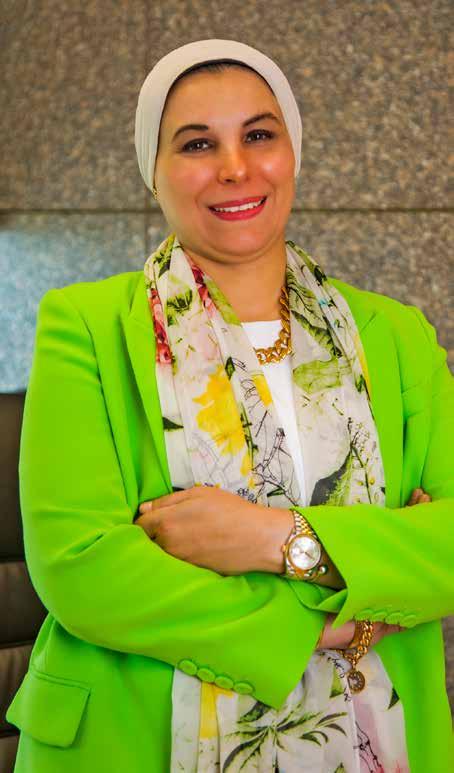
Ensuring the Group maintains a robust financial position, with sufficient capital and liquidity to support its operations and growth objectives.
Overseeing the preparation of accurate and timely financial reports that offer transparency and insight into the Group’s financial performance for stakeholders, including shareholders and lenders.
Implementing strategies to optimize the Group’s cost structure while maximizing profitability and delivering returns for shareholders.
During my 20 years of service at the bank, I have had the privilege of experiencing a positive work environment where my gender as a woman has not hindered my leadership. AFREXIMBANK fosters inclusivity and values diversity, recognizing the wealth of perspectives that women bring to leadership roles and acknowledging their valuable contributions.
What challenges have you faced in your career, particularly as a Muslim woman in a predominantly male-dominated industry, and how have you overcome them?
AFREXIMBANK has established an inclusive and supportive environment where individuals are acknowledged based on their skills, expertise, and dedication, rather than encountering barri-
Continuous Learning and Development: I prioritize my own continuous learning and development, staying informed about the latest research, trends, and best practices related to gender diversity and inclusion. This enables me to effectively advocate for change and drive meaningful progress within my organization and the industry at large.
Overall, my commitment to advocating for and supporting the advancement of women stems from a belief in the importance of diversity and inclusion in driving organizational success and fostering a more equitable society. By actively championing women’s advancement, hope to contribute to positive change within my organization and inspire others to do the same
HELEN BRUME
Director, Projects & Asset Based Finance
What has been your experience as a woman working in the predominately male dominated finance industry?
What has been your experience as a woman working in the predominately male dominated finance industry?
My affirmative experience and AFREXIMBANK ‘s steadfast commitment to gender and religious diversity serve as a beacon for other organizations.
Sharing success stories and highlighting the importance of inclusivity can encourage more institutions to adopt similar approaches, thereby advancing gender equality across various sectors.
As an accomplished woman in leadership, how do you advocate for and support the advancement of women within your organization and the industry at large?
As an accomplished woman in leadership, advocating for and supporting the advancement of women within my organization and the broader industry is a priority for me. Here are some ways I do this:
Mentorship and Sponsorship: I actively mentor and sponsor women within my organization, providing guidance, support, and opportunities for professional development. I advocate for them in meetings and discussions, helping to amplify their voices and ensure their contributions are recognized and valued.
Creating a Supportive Environment: I work to foster a supportive and inclusive work environment where women feel empowered to thrive and succeed. This includes advocating for policies and initiatives that promote gender diversity, such as flexible work arrangements, parental leave policies, and leadership development programs tailored to women’s needs.
Leading by Example: lead by example, demonstrating the value of diversity and inclusion through my actions and decisions. By showcasing my own success as a woman in leadership, I inspire other women to pursue their career goals and break through barriers.
Advocacy and Thought Leadership: I use my platform and influence to advocate for gender diversity and equality both within my organization and in the broader industry. This includes speaking out on issues related to gender bias, discrimination, and barriers to advancement, and championing initiatives aimed at addressing these challenges.
As a woman you constantly have to reinvent yourself and be open to new opportunities. It’s also important to recognize your potential and trust your abilities. You have to recognize that every woman is unique and brings some level of additionality to the table.
I started my career on Wall Street over two decades ago and the industry has evolved since that time. There have been women who have made sacrifices and paved the way for younger women like me to thrive and be successful in the financial industry.
I have been fortunate to benefit from strong female role models both from a personal and professional perspective. I don’t let anyone define what I am capable of and I am constantly ready to take on new challenges.
What has been your experience at the AFREXIMBANK as a female Director heading Projects and Asset-Based Finance?
It’s been very interesting but not without its challenges. My career background spans over 22 years in the financial services industry with an even mix of Corporate and Investment Banking. This is, however, my first foray into the world of Development Finance. It takes a special set of skills to navigate the world of Development Finance especially in Africa. The continent is at its cusp of industrialization and it is our duty as a Development Finance nstitution to help Africa attain its industrialization objectives. Industrial development is of critical importance for sustained and inclusive economic growth in African countries. Our mandate is to support the development of Trade on the continent. However, we recognize that in fulfilling that mandate, we need to support the development of Trade Enabling Infrastructure and the Manufacturing Sector. In my role, we provide long term financing to support the development of the full range of infrastructure projects across Africa which covers, Power, Extractives, Mining, Port Infrastructure, Aviation Finance etc.
Can you discuss any specific policies or programmes at AFREXIMBANK aimed at empowering women in trade?
We are firmly committed to the development of Intra African Trade on the continent. 40% of Intra African trade is dominated by micro, small and medium sized enterprises. Considering the disproportionate gender disparities that exist both at the corporate and small enterprise level, structured programmes promoting women’s development in the sector are critical
The bank plays an active role in facilitation, capacity building and collaborations with financial institutions, in providing gender focused financing to support women-led and women-owned small to medium scale businesses. In terms of facilitation, AFREXIMBANK advocates for discussions around policy reforms and regulatory frameworks that support women’s inclusion within the financial system as well as mainstream gender considerations across sectors and various government interventions. We also collaborate with partners that provide targeted financial education and literacy programmes aimed at women. These collaborations provide capacity-building opportunities for women, training programmes, mentorship, visibility platforms (market access) and networking opportunities.

Through partnerships and stakeholder engagement, the bank is in continuous engagement with relevant stakeholders, financial institutions, private entities, and governments towards the inclusion of women within sectors that enables them access suitable and fit for purpose financing in a bid to advance gender equity and equality as well as to tackle deeply rooted structural inequities related to the access to financing.
How do you think men in leadership roles can effectively contribute to gender equality and the empowerment of women in the workplace?
The most specific role men can play is by being suitable mentors and sponsors. Men can offer mentorship to women who aspire to leadership positions. Men should be our biggest advocates in the workplace and should be enthusiastic about sharing their knowledge, experiences, and insights to help women navigate their careers and develop leadership skills. Men can also provide guidance, advice, and opportunities for skill or personal development.
COVER Sunday March 17, 2024 Vol. 22, No. 10531 Sunday, March 17, 2024 Vol. 22, No. 10531 20 21
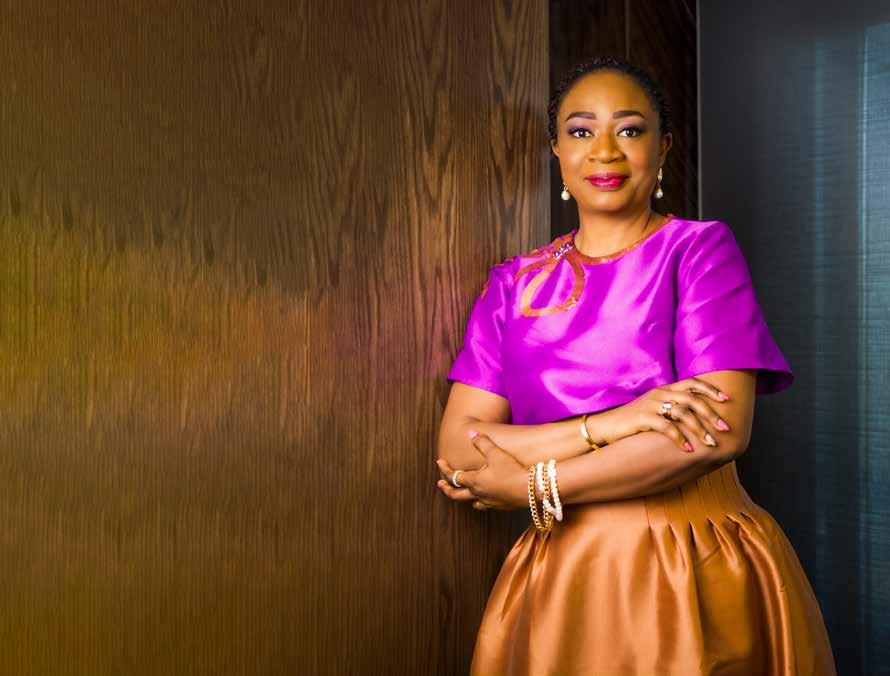 ANNE EZEH Director, Communications & Events
ANNE EZEH Director, Communications & Events
Women’s representation in leadership positions continues to be a topic of discussion. What steps do you think AFREXIMBANK can take to ensure gender diversity within its leadership ranks?
There have been so many examples of women exceling in leadership positions that one wonders why it is still debatable. We have seen women stand out in politics, governance, business, and the arts, and even in moments of daunting global crisis. This discussion should really be a non-starter by now. That said, for those who still need convincing or who frankly prefer to ignore this obvious fact, I have a few words – Women will continue to excel at whatever they put their mind to. I’m extremely grateful for an organization like AFREXIMBANK, where female representation in leadership is not a passing fad. We have a female Executive vice president, a top tier bench of female Directors and Senior Managers who hold critical portfolios within the bank and who lead with focus and determination but who also lead with a lot of graceful excellence. As female leaders at AFREXIMBANK, we are also committed to ensuring that we continue to build out this leadership cadre through our young professional programmes, our coaching and mentoring initiatives and our female employee engagement programmes and policies. The bank’s focus on gender diversity is not limited to leadership roles only. Our programmes and initiatives under our Creative Africa Nexus initiative and our SME programmes are developed strategically to ensure that women and women-led businesses receive focused attention and therefore can benefit directly.
Given your extensive experience, how do you leverage your background in global communications in enhancing the bank’s presence and outreach?
I pride myself on being focused on impactful and results oriented communications, and so when I joined the bank a few months ago, was excited about the opportunity to contribute directly to impactful interventions on the continent through a truly pan-African organization. I honestly was not sure of what to expect though, as the word on the street as it pertains to the

“TORLOWEI AS ART?












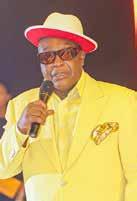











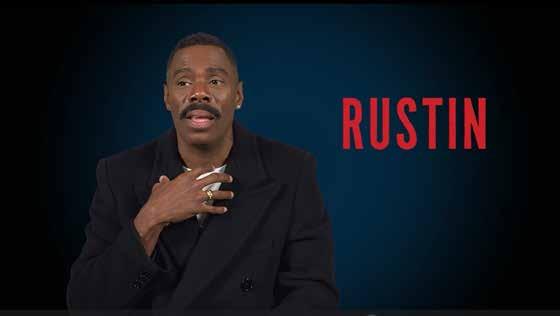















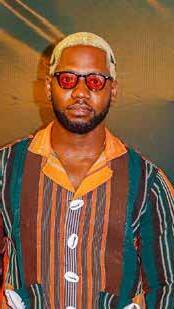








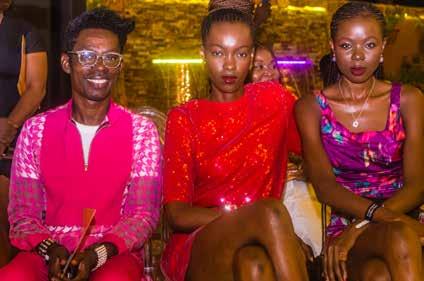

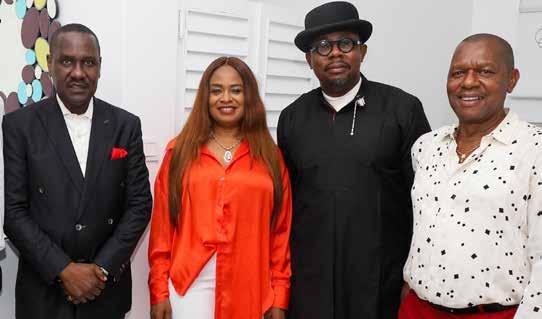
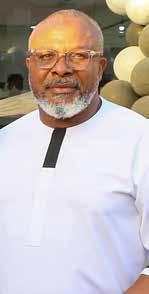


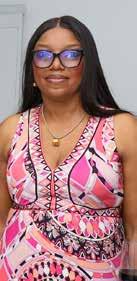

















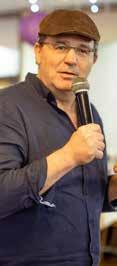




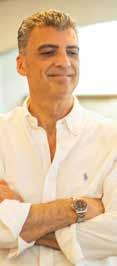














 MO ABUDU
MO ABUDU








 ANNE EZEH Director, Communications & Events
ANNE EZEH Director, Communications & Events



